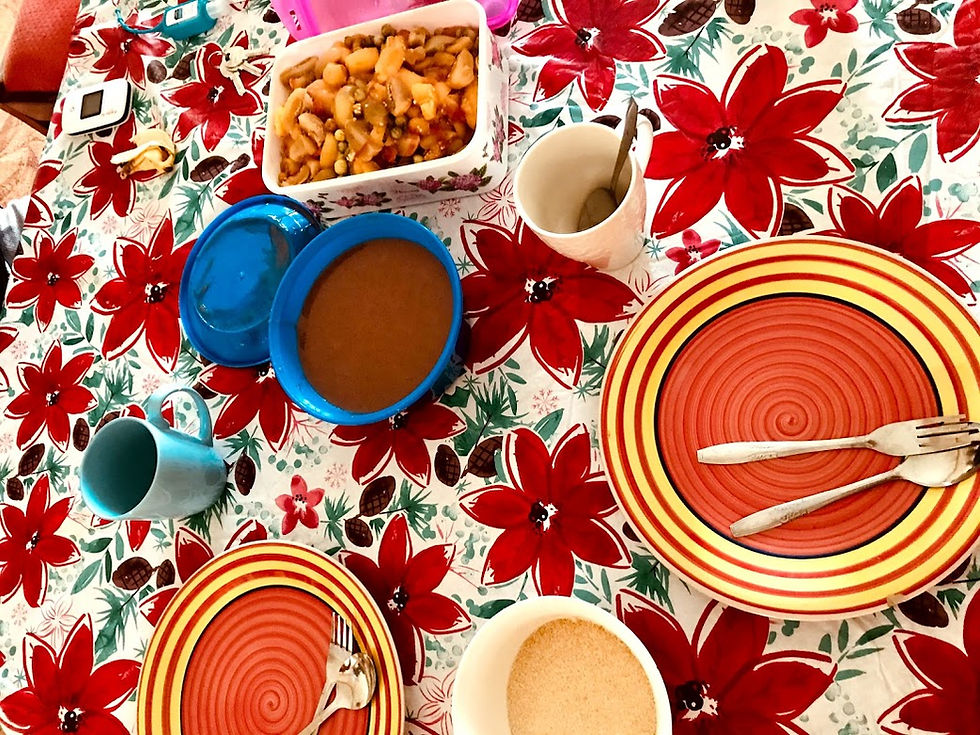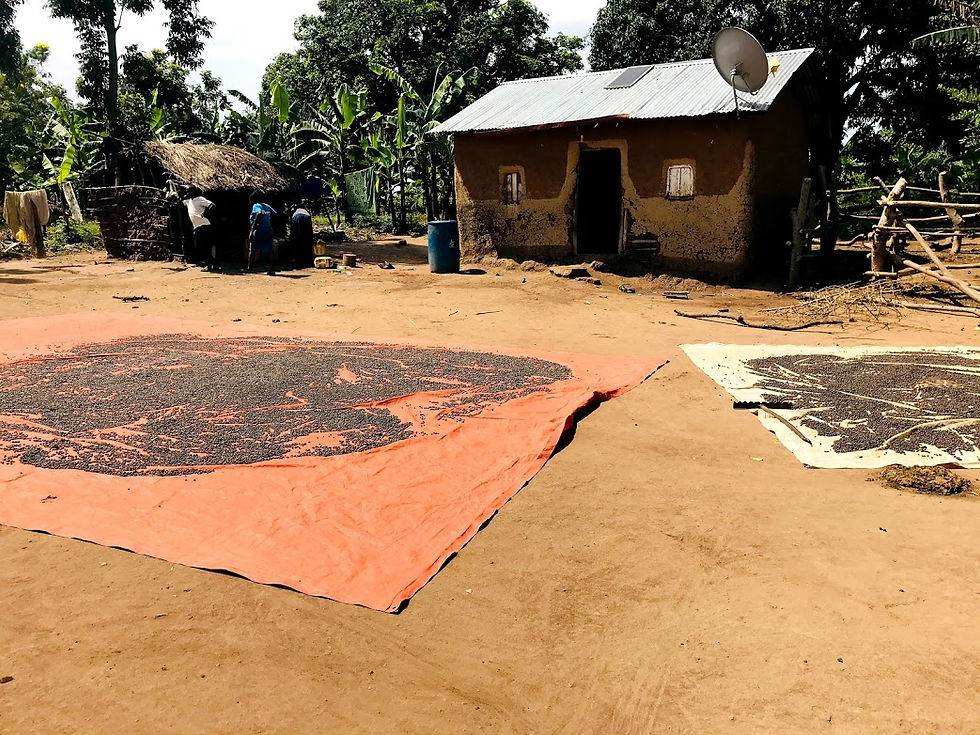Uganda - East Africa
- nharkreader

- Jan 1, 2021
- 5 min read
Updated: Feb 28, 2023
Ten Ugandan Beauties From The Eye of a Newbie
Merry Christmas and Happy New Year from Uganda!
I arrived last week on Saturday, December 19th in Entebbe, Uganda after four flights and 40 hours of travel. On Sunday, we made the two-hour trek to the Father to the Fatherless property near the quaint village of Namuganga.
So far, I have been pleasantly surprised with many aspects of Uganda and Ugandan culture!
First: matooke

Matooke, if you have never experienced the joy of eating it, comes in many forms but is a specific type of hearty plantain either mashed and steamed in banana leaves or boiled. You can eat it with anything! Most commonly it is eaten with beans, potatoes, greens, cassava root, or luwambo (any steamed meat served with the juice). We eat matoke for every meal of the day!
Second: driving
When you think that it is only a foot trail, you are wrong. In the villages, you drive through the heart of the jungle; in the city, everyone drives fast, you never have to stay inside the lines, you disregard personal space, and, best of all, you can use your flashers to say:
I am passing you
your lights are too bright
your lights aren’t bright enough
there’s a goat!
I am going first
look at me
hey, we have the same car
just saying hi for fun
I think I will do just fine driving in Uganda.
Third: smell

There are so many different smells in Uganda – it was like my nose exploded! I initially noticed the fresh smell of everything green and growing – the flowers, the banana and mango trees, the corn crop, the tea, the beans. The use of herbs for medicine is limitless in Uganda. There is a plant to treat every symptom, even smelly armpits! On the Father to the Fatherless compound, we have an abundance of produce; everything we eat comes directly from the land that we grow and maintain.
Fourth: language
Rather than saying hello or hi, the most common greetings are olyotya (how are you?) and mukama ye bazibwe (praise God) in which you respond amiina!
The language is beautiful with much intonation and relative sounds to replace letters. And even more than the beautiful sound of the language, is the heart behind it. It is a simple language, but with each greeting and response there is a heart that truly cares to know. And with language comes singing! Everyone, and I mean everyone, sings in Uganda. Praise is limitless. With the beating of drums and singing of praise, we worship our God!
Fifth: dancing
Any dance move goes. If you’re moving your body, you’re doing something right. Hakuna Matata.
Sixth: time

Hakuna Matata means no worries for the rest of your days! There is no schedule, there is no on-time or late, there are no clocks, there are no calendars. Time is relative! We stay for as long as we stay, we work for as long as we work, we rest for as long as we rest, we laugh and talk and enjoy each moment together as it comes. There is no better time than now, and you are always welcome!
Seventh: joy

Praise the Lord for true and sustaining joy. The people in Uganda know well that life’s pleasures are fleeting, but the joy of the Lord is everlasting. Each person I have met has had a heart filled with gratitude and a joy rooted in love. The kindnesses, the laughter, the love is contagious. And each child, although sometimes skeptical of me at first, smiles back.
Eighth: people

The joy lives among the people; the Holy Spirit lives among the people. In all the ways Jesus offers grace and mercy and love to each person, and even more so to an outsider, so have the people here invited me in as one of their own – to share in love and life with.
Ninth: fruits of labor

The hands of those who labor with the joy of the Lord. Day to day, Ugandans are doing what they need to do to provide for their people. Many hands are laboring:
peeling plantains for matooke
cooking for hours in preparation of lunch and dinner
harvesting the vegetables that children will eat for months to come
building the infrastructures that will house many
clutch the gas as they drive their motorcycles through winding roads and fast traffic to deliver milk to the community
This is Uganda. And the fruits of labor are evident when hungry children are fed, when families lose their mud huts to rainstorms and seek shelter, when there is a safe place to go, when help is needed and people respond from miles away to your drum call. This is Uganda.
Tenth: faithfulness

He who is faithful in what is least is faithful also in much.
.
.
.
After Jesus’ death, he appears for the third time to his disciples on the shore while they are fishing for food. Initially they did not know it was him. While he was on the shore, he prepared for them a fire with coals and fish and bread, and when they caught an abundance of fish from the sea, they returned to him and he prepared them breakfast. After they had eaten breakfast, Jesus said to Simon Peter,
“Simon, son of Jonah, do you love me more than these?” He said to Him, “Yes, Lord: You know that I love You.” He said to him, “Feed My lambs.”
He said to him again a second time, “Simon, son of Jonah, do you love Me?” He said to Him, “Yes, Lord; You know that I love You.” He said to him, “Tend My sheep.”
He said to him the third time, “Simon, son of Jonah, do you love Me?” Peter was grieved because He said to him the third time, “Do you love Me?” And he said to Him, “Lord, You know all things; You know that I love You.” Jesus said to him, “Feed My sheep.”
John 21:15-17
That is the last encounter Jesus has with His disciples before He is raised up.
On the Saturday following Christmas, I was given the chance to share my testimony. In my sharing, I found myself praising God for His people – the people here, these people, are the Lord’s people that He desires to know and love deeply. His people span the globe across oceans and borders; across languages and cultures. And when I read His words to Simon Peter, I knew they were words to me –
Do you love me? Do you love my people? Love and care well for My people, for My children.
Jesus, the Great Shepherd, calls His disciples to feed, to tend, to love, to guide, to remind and to call back His lambs and His sheep. These are the Lord’s people! Let us be faithful in word and in action; let us be faithful in loving few so we are prepared when entrusted to love many.
Mukama ye bazibwe.



Nicole Wow, you write so beautifully. I hope you're journaling every day so that you can write a book. I know it would be phenomenal. Miss you. Aunt Margaret